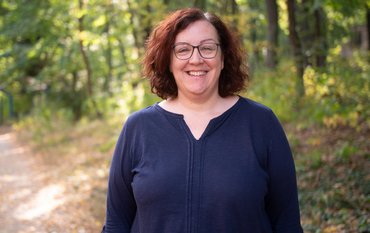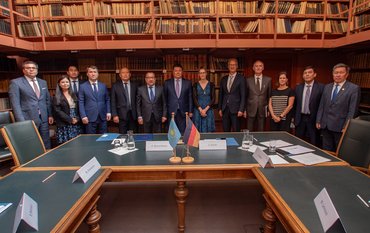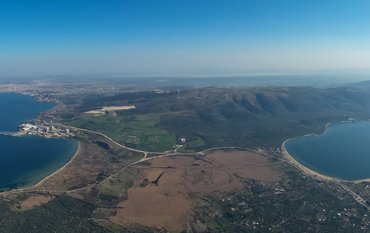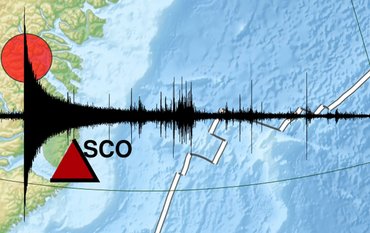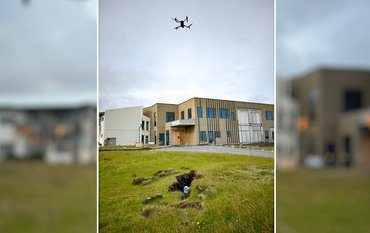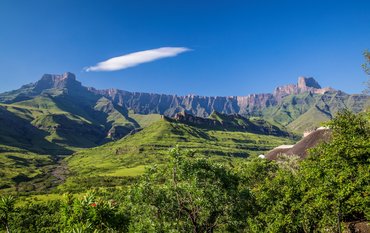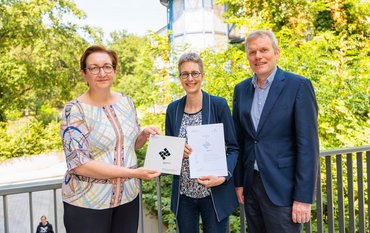In rare cases, tsunamis can also be triggered by volcanoes and landslides. Until now, the Indonesian tsunami early warning system has not been able to include such risks. A scientific cooperation project between Indonesia and Germany is now set to change this.
Along the southern coast of Indonesia, the Indo-Australian plate is subducting under the Eurasian plate at a drift rate of about six centimeters per year. One consequence of subduction is the formation of a narrow volcanic belt in Indonesia's hinterland with 127 active and partly highly explosive volcanoes. Devastating tsunamis triggered by volcanic eruptions or landslides at volcanoes are rare, however. In about 90 percent of the cases, tsunamis are the result of the deformation of the sea floor during a severe earthquake. However, landslides, volcanic eruptions and theoretically even meteorite impacts are also possible causes. After all, about five percent of the tsunamis proven since the year 1600 can be traced back to volcanoes. And these caused more than 25% of all deaths at volcanoes.
The most recent example of a major flank collapse at a volcano in Indonesia is the landslide at Anak Krakatau on December 22, 2018, which was followed by meter-high tsunami waves hitting coastal areas of the islands of Java and Sumatra along the Sunda Strait. At the time, the German Research Centre for Geosciences had used low-frequency recordings at 74 seismic stations to locate a near-surface seismic source at Anak-Krakatau. From a comparison of satellite images before and after the event, it could be seen that part of the western flank of Anak-Krakatau had slipped and the broken-off material displaced immense masses of water in the sea. However, all this could only be determined after the flank collapse. Such landslides at volcanoes often occur very slowly at the beginning, often only a few millimeters per month. Much time can pass before a volcanic flank finally gives way and plunges into the sea. Continuous real-time monitoring of such rare events is not yet provided for in Indonesia's GITEWS tsunami early warning system.
The Indonesian tsunami early warning system currently in use is based primarily on models that couple seismological data with GPS measurements and the measurement of sea level fluctuations. Now - through the joint research of 22 Indonesian partner institutions and seven German scientific institutions - risks emanating from volcanoes and landslides will also be examined more closely. Apl. Prof. Dr. Thomas Walter, who heads a working group in the Earthquake and Volcano Physics Section at the GFZ, is leading the effort on behalf of the German Research Center for Geosciences.
Remote sensing methods, seismic monitoring at volcanoes, but also modeling, especially of flank instabilities, will play a major role in the project. A spin-off company of the GITEWS project, which was involved in the construction and installation of the operational early warning system, is again part of the project. It will help develop concepts for landslide monitoring and early warning into the existing early warning system. In addition, social science research questions are also in focus, because often technical aspects are not necessarily decisive in the early warning chains on site. The last link in the information chain, the human being, and the behavior of the population determine the success of such systems. Recommendations for political action are therefore also to be developed.
The cooperation project "TsunamiRisk" will run from March 1, 2021 to February 29, 2024 and is funded by the German Federal Ministry of Education and Research. With the funding measure "CLIENT II - International Partnerships for Sustainable Innovation", the BMBF supports demand-oriented research collaborations with selected emerging and developing countries. The international collaborative projects develop innovative and sustainable solutions for the climate, environment, resources and energy sectors that contribute to overcoming specific challenges in the partner countries.
Further information:
- BMBF announcement on the start of the project: Tsunamis after volcanic eruptions: Researchers want to improve early warning
Scientific contact:
Apl. Prof. Dr. Thomas Walter
Group Leader
Physics of Earthquakes and Volcanoes
Helmholtzstraße 6/7
Building H 7, Room 318
14467 Potsdam
Email: twalter@gfz-potsdam.de








![[Translate to English:] Martin Herold standing in front of the library on the Telegrafenberg](/fileadmin/_processed_/c/d/csm_Martin_Herold_d385ee4dd9.jpeg)
![[Translate to English:] Many people are listening to a presentation in the GFZ lecture hall.](/fileadmin/_processed_/c/a/csm_1_Bild1_hell_b9c0e9f5ed.jpeg)





![[Translate to English:] Both scientists sitting on stools in front of a wall of books in the Telegrafenberg library](/fileadmin/_processed_/6/6/csm_Buiter_Castell_DORA_4_e87cb1ea18.jpeg)
![[Translate to English:] Gruppenbild mit 4 Personen](/fileadmin/_processed_/8/d/csm_20241017_GFZ-Emmerman-Medal-005_web_reinhardtundsommer_21a414fa4a.jpeg)






![[Translate to English:] Ice landscape with five red tents](/fileadmin/_processed_/8/9/csm_Zeltlager_auf_dem_Eis_Urheberin_Jenine_McCutcheon_5ced2d523b.jpeg)


